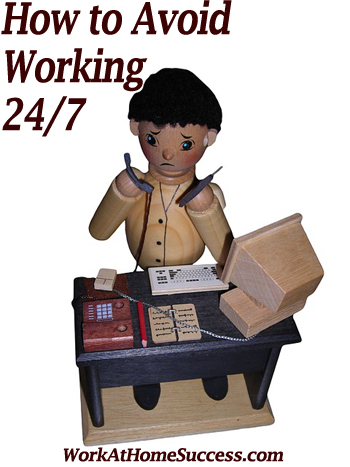How to Avoid Working 24/7 from Home
There are many challenges to working from home. One is having the self-discipline to do the work without being distracted by stuff going on at home. The other is working all the time.
It’s not uncommon for home-based workers to put in more hours than they would at a job. Sometimes they’re focused on a project, but other times, the boss or clients are calling at all hours of the day needing help. It’s almost as if they think because your office is in your home, you can take care of stuff whenever, which is technically true, but not a good way to run your life. Here are tips to avoiding overworking from home.
Nearly all the suggestions you’ll see below have to do with setting boundaries and then enforcing them. It’s easy to set boundaries, but much harder to stick to them especially if your boss or client is calling. But if you give in, you’ll work too much, risk burn-out and likely begin to resent the people you work for.
1) Create a schedule and let everyone know about it. Your boss probably wouldn’t call you at home at night if you worked onsite, so it’s not unreasonable to expect him not to call during off hours when you work at home. If you freelance, let your clients know upfront your work hours. This is especially helpful if your clients are in a different time zone.
2) Develop a system for having clients contact you. As a customer, automated phone systems or online FAQ pages are annoying, but as a home-based worker, systems can be helpful to reducing interruptions and unnecessary questions. You may not have an automated phone system, but you should have a FAQ page on your site or send FAQ information when an email request comes in. You need to let clients know up front the best times and methods for getting in touch. Finally, give them a time frame for a response. This is challenging, because you want to be responsive to your clients’ needs, and yet you can’t spend your day putting out fires. Hiring a virtual assistant is a great way deliver quick customer support and have someone weed out the “emergencies” you need to respond to vs those that aren’t dire.
3) When you’re off, be off. That means don’t answer the phone or email. Turn off ringers and notifications so you’re not tempted to answer or worry about not answering. The only way others will respect your work hours and off time is if you stick to them.
4) When you’re on vacation, let your clients or boss know you’ll be gone and what they can do instead of calling you. That means you should have someone cover for you. Or if you plan to work on vacation, provide the short time frame they can expect to connect with you.

